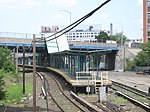Newtown Creek Wastewater Treatment Plant
1967 establishments in New York CityGovernment buildings in BrooklynGreenpoint, BrooklynIndustrial buildings and structures in BrooklynSewage treatment plants in New York (state) ... and 1 more
Waste management infrastructure of New York City

The Newtown Creek Wastewater Treatment Plant is the largest sewage treatment facility operated by the New York City Department of Environmental Protection. Since 2010, its eight metallic "digester eggs," which are 140 feet (42 meters) tall and dramatically illuminated with blue light at night, have made it a local landmark, particularly to motorists on several nearby roadways in the New York City boroughs of Brooklyn, Queens, and Manhattan. It is located on the Newtown Creek in Brooklyn's Greenpoint neighborhood along Greenpoint Avenue.
Excerpt from the Wikipedia article Newtown Creek Wastewater Treatment Plant (License: CC BY-SA 3.0, Authors, Images).Newtown Creek Wastewater Treatment Plant
Huron Street, New York Brooklyn
Geographical coordinates (GPS) Address External links Nearby Places Show on map
Geographical coordinates (GPS)
| Latitude | Longitude |
|---|---|
| N 40.734167 ° | E -73.946389 ° |
Address
Newtown Creek Wastewater Treatment Plant
Huron Street
11222 New York, Brooklyn
New York, United States
Open on Google Maps








